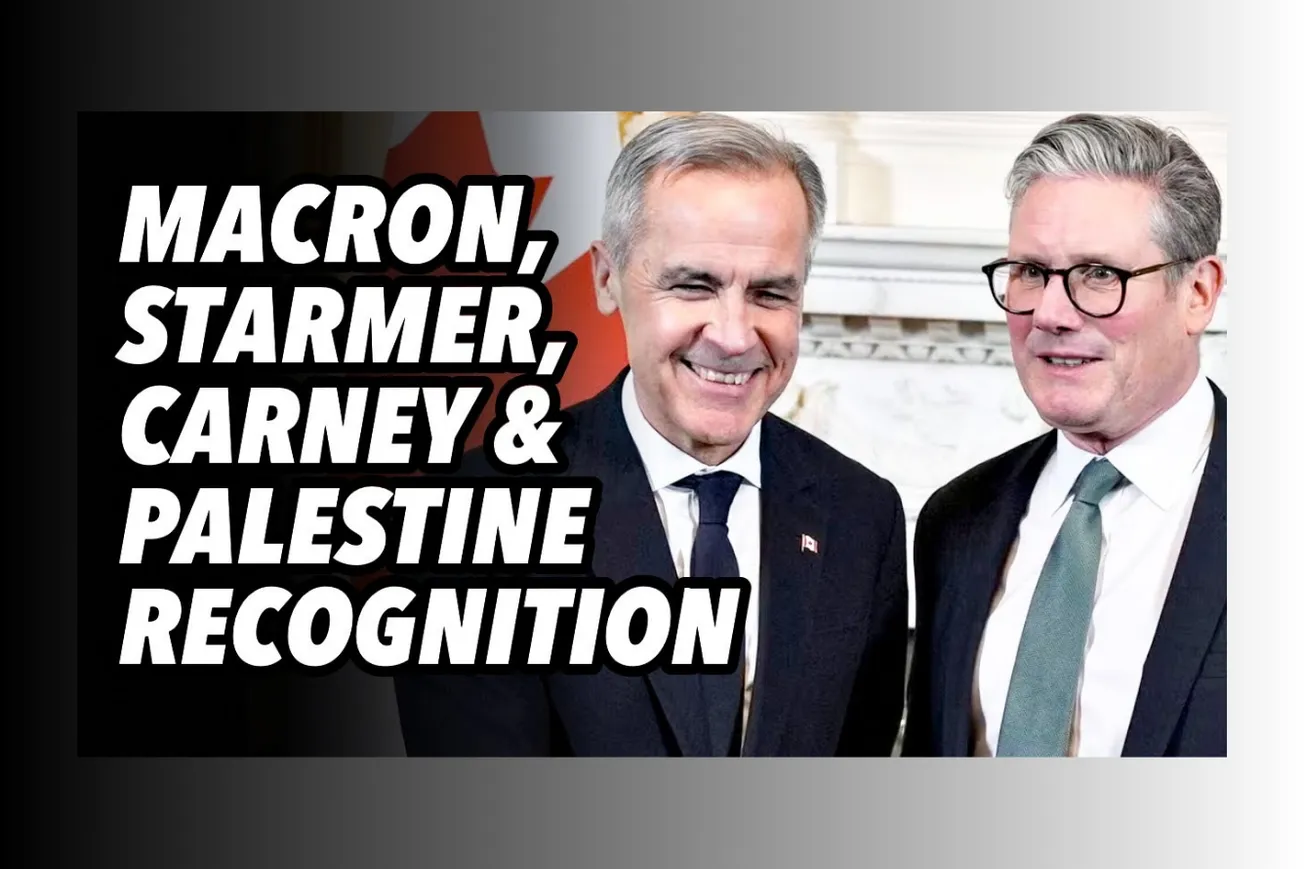Table of Contents
Major Western leaders including Macron, Starmer, and Canada's Carney are pledging to recognize Palestinian statehood by September, but the timing and conditions reveal this might be more about domestic politics than meaningful change.
Key Takeaways
- Several Western countries are committing to recognize Palestinian statehood by September, but all with significant conditions attached
- The timing appears strategically linked to domestic political pressures rather than genuine diplomatic breakthrough
- Leaders like Starmer face mounting criticism over Gaza policy from their own voter base, especially Labour supporters
- Recognition requires ceasefires and proper Palestinian government formation - conditions that seem unlikely to be met
- While short-term ground realities won't change, long-term diplomatic implications could be substantial for Israel
- Hamas remains the power on the ground in Gaza, creating a fundamental obstacle to these recognition plans
- Trump has already signaled strong US opposition, setting up potential transatlantic tensions
- Even if recognition happens, it may be too little, too late to meaningfully alter the current crisis trajectory
The September Deadline: A Coordinated Western Response
Here's what's really happening with this sudden wave of Palestinian recognition promises from Western capitals. About a week and a half ago, French President Macron kicked things off by announcing France would recognize Palestinian statehood. Then, like dominoes falling, other major Western leaders started making similar commitments.
Keir Starmer jumped in, saying the UK would "of course" recognize Palestine - though he was careful to add those important caveats. Canada's leadership followed suit, with officials stating they're ready to recognize Palestine under certain conditions. Even Germany's being pressured, though Chancellor Merz hasn't made any firm commitments yet.
- All these announcements share one thing in common: they're targeting September as the recognition date
- The timing coincides with upcoming UN General Assembly meetings and potential Security Council sessions
- Every single promise comes loaded with conditions about ceasefires and proper Palestinian governance
- There's clearly been coordination behind the scenes - this isn't coincidental timing
What's fascinating is how quickly this momentum built. We went from isolated statements to what looks like a coordinated Western strategy in a matter of weeks. But when you dig deeper into the actual conditions these leaders are setting, you start to see this might be more about managing domestic pressure than creating real change on the ground.
The conditions revolve around some sort of ceasefire taking place first. Canada's position is particularly detailed - they're demanding not just a ceasefire, but some sort of election or proper government formation in this future Palestinian state. It's a high bar that seems almost designed to provide an exit ramp if needed.
Starmer's Political Survival Strategy
Let's be honest about what's driving this from the British side. Starmer's in serious political trouble, and his Gaza policy is a big part of why. His government essentially functions without really governing effectively anymore - they're basically going through the motions while facing rebellion after rebellion from their own parliamentary party.
The man was never particularly popular to begin with, but his handling of Gaza has created a perfect storm. He's got Jeremy Corbyn breathing down his neck with a new left-wing party that's actually polling level with Labour in some surveys. That's not hyperbole - we're talking about a genuine threat to Labour's electoral future.
- Labour's traditional voter base is overwhelmingly pro-Palestinian, and they're furious about Starmer's perceived inaction
- The recent meeting with Trump in Scotland was widely viewed as a complete humiliation for Starmer
- His parliamentary party has been increasingly rebellious, with Gaza policy being a major flashpoint
- Corbyn's new party is specifically targeting Labour voters who feel abandoned on Palestine issues
Here's the thing about Starmer's position - he's caught between domestic pressure from his base and international pressure from allies like the US. The Palestine recognition promise gives him something to point to when Labour supporters demand action, but the conditions attached provide enough wiggle room to avoid actually following through if the political winds shift.
This is particularly clever politics because it addresses the immediate pressure without committing to anything that would seriously damage UK-US relations. Trump's already made it clear he opposes this move, so Starmer gets to look tough by potentially defying Trump while knowing he might never actually have to follow through.
The Hamas Problem Nobody Wants to Talk About
There's a fundamental flaw in all these recognition plans that everyone's dancing around: Hamas controls Gaza. You can't just wish away the reality that Hamas is the power on the ground. These European leaders are essentially trying to recognize a Palestinian state while pretending the actual governing authority in Gaza doesn't exist.
The recent statement from European countries and some Gulf States basically called on Hamas to disband itself and disarm so a ceasefire could happen. Think about how unrealistic that is - you're asking a militant organization that just fought a major war to voluntarily dissolve itself. It's not happening.
- Hamas isn't going to voluntarily step aside for the Palestinian Authority to take control of Gaza
- Israel has zero interest in seeing a strengthened Palestinian Authority that could later challenge their policies
- The US under Trump has already signaled opposition to this entire recognition framework
- Even if recognition happens, it doesn't address the fundamental power dynamics on the ground
The idea seems to be that recognizing the Palestinian Authority as a state would somehow extend its authority to Gaza and get around the Hamas obstacle. But authority isn't just about recognition - it's about actual power and control. The Palestinian Authority doesn't have the military capability or popular support to displace Hamas in Gaza.
What's really happening here is that European leaders are trying to solve a military and political problem through diplomatic recognition. It's putting the cart before the horse in a way that reveals how limited their actual options are.
Why September Won't Change Anything (At Least Not Immediately)
Even if all these countries follow through on their September promises, even if there's no ceasefire and Israel doesn't make any moves toward negotiations, the immediate impact will be minimal. Recognition doesn't automatically translate to changed realities on the ground.
Trump has already made it absolutely clear that he's not supporting this in any way, and he speaks for the US government on this issue. Congress is also opposed. So you'll have some European countries recognizing Palestine while the most powerful Western nation actively opposes it.
- Palestinian embassies might open in some European capitals, creating symbolic victories
- There could be attempts to give Palestinian delegations voting rights in UN General Assembly sessions
- But none of this changes Israel's control over Palestinian territories or addresses the security situation
- The fundamental issues - borders, settlements, security arrangements - remain completely unresolved
Here's what's really telling: even the advocates for this recognition acknowledge it won't change short-term realities. This is essentially a symbolic gesture designed to relieve domestic political pressure while avoiding the hard work of actually addressing the underlying conflict.
The timing also seems designed to let current leaders pass the buck to their successors. Starmer might be gone in six months to a year anyway, so he can make this promise and leave it to the next government to deal with the consequences.
Long-Term Consequences Could Be Significant
But here's where it gets interesting - while immediate changes might be minimal, the long-term implications could be substantial. Once you recognize a state, you can't easily unrecognize it. This creates new diplomatic realities that could build momentum over time.
International recognition gives Palestinian leadership new platforms and legitimacy in global forums. We've already seen how diplomatic initiatives in the United Nations can eventually lead to ceasefire resolutions in the Security Council - there was one that both Trump and Israel basically ignored, but it shows how these things can develop.
- Recognition could gradually intensify political pressure on both Israel and the United States
- It provides new avenues for Palestinian diplomacy and international legal challenges
- Over time, it could contribute to Israel's growing diplomatic isolation on Palestinian issues
- The cumulative effect of multiple recognitions could shift international law interpretations
For Netanyahu and Israel's hardliners, this recognition push represents a massive potential defeat. Their reaction won't be to moderate their position - it'll be the opposite. We can expect them to intensify efforts to establish more "facts on the ground" in the West Bank and Gaza, moving toward full annexation.
The hardliners will see this as validation that the international community is moving against Israel, which historically has led them to double down rather than compromise. They'll have significant support within Israel for this approach, and probably support in Washington too under Trump.
The US Pressure Campaign Is Already Starting
Don't think for a second that the US is sitting passively while European allies plan Palestinian recognition. They're already putting pressure on the UK, France, and Canada to reverse course. The question is whether these leaders can politically afford to capitulate.
Starmer's position is particularly precarious here. His recent meeting with Trump was viewed as a complete disaster in Britain - the optics were terrible, and the universal view was that he was completely humiliated. If he caves to Trump pressure on Palestine recognition too, it could be the final straw for many Labour supporters.
- The domestic political cost of backing down might be higher than the international cost of defying the US
- Trump's heavy-handed approach might actually make it harder for European leaders to reverse course
- This sets up potential transatlantic tensions just as Trump is trying to rebuild Western unity on other issues
- European publics are increasingly sympathetic to Palestinian positions, limiting leaders' room for maneuver
This creates an interesting dynamic where Trump's own diplomatic style might be undermining his policy objectives. By making opposition to Palestinian recognition such a public red line, he's making it politically costly for European leaders to comply without looking weak to their own voters.
Starmer's inclination would probably be to find a way to avoid confronting Trump directly, but his domestic political situation might not allow for that kind of flexibility anymore.
The September deadline is approaching fast, and it's looking increasingly like several Western countries might actually follow through on recognition despite US pressure. Whether that creates meaningful change for Palestinians or just adds another layer of complexity to an already impossible situation remains to be seen.
What's clear is that this recognition push reveals just how limited Western options really are when it comes to the Palestinian issue. Unable to meaningfully pressure Israel or challenge US policy directly, European leaders are falling back on symbolic gestures that satisfy domestic audiences while avoiding the hard choices that might actually make a difference.





